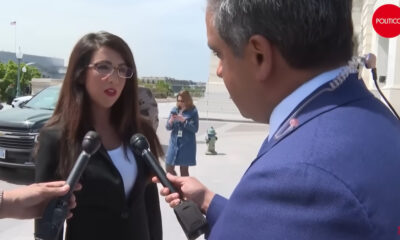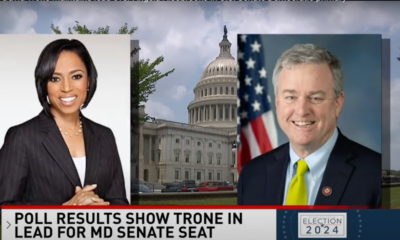Politics
FBI Director Wray speaks before House budget hearing
FBI Director Christopher Wray appeared before a House budget hearing today, offering lawmakers insights into the bureau’s priorities and resource needs for the upcoming fiscal year.
FBI Director Christopher Wray appeared before a House budget hearing today, offering lawmakers insights into the bureau’s priorities and resource needs for the upcoming fiscal year. Wray’s testimony comes at a critical juncture for the agency, as it continues to grapple with evolving threats and challenges in the realms of national security, cybercrime, and domestic extremism.
During his remarks, Director Wray emphasized the importance of robust funding to support the FBI’s mission of protecting the American people and upholding the rule of law. He outlined key areas where additional resources are needed, including cybersecurity, counterterrorism efforts, and combating violent crime.
“Director Wray emphasized the importance of robust funding to support the FBI’s mission of protecting the American people and upholding the rule of law.”
In particular, Wray highlighted the growing threat posed by cyberattacks and the need for increased investment in cyber capabilities to defend against malicious actors. He underscored the FBI’s role in investigating cyber intrusions, disrupting cybercriminal networks, and safeguarding critical infrastructure from digital threats.
Additionally, Director Wray addressed concerns about the rise of domestic extremism and the FBI’s efforts to combat violent ideologies that pose a threat to public safety. He stressed the importance of partnerships with state and local law enforcement agencies, as well as community organizations, in identifying and addressing extremist threats.
Throughout his testimony, Wray fielded questions from lawmakers on a range of issues, including the FBI’s response to recent high-profile cyberattacks, efforts to combat human trafficking, and steps to improve diversity and inclusion within the bureau.
The House budget hearing provides an important forum for congressional oversight of the FBI’s operations and budgetary needs. Lawmakers will weigh Director Wray’s testimony as they consider funding allocations for the bureau in the coming fiscal year, balancing competing priorities and national security imperatives.
As the FBI continues to adapt to emerging threats and challenges, Director Wray’s testimony serves as a roadmap for lawmakers seeking to ensure that the bureau has the resources and support necessary to fulfill its vital mission in an increasingly complex and interconnected world.
Politics
Reflecting on South Africa’s Historic Election Anniversary: Why It’s Poignant This Year
The recent clash among GOP lawmakers over Senator Johnson’s handling of a foreign aid package underscores the complexities within the party.

As South Africa approaches the anniversary of its historic election, the significance of this milestone is particularly poignant in 2024. Marking [number of years] years since the nation’s first democratic elections, which took place on April 27, 1994, this anniversary holds profound meaning for South Africans and the global community alike.
Here are several reasons why this anniversary carries heightened significance this year:
Celebrating 30 Years of Democracy: This year marks three decades since the end of apartheid and the birth of democracy in South Africa. The 1994 elections, in which Nelson Mandela was elected as the country’s first black president, symbolized the triumph of hope over oppression and marked the beginning of a new era of equality and freedom.
Reflection on Progress and Challenges: The anniversary serves as an opportunity for South Africans to reflect on the progress made since the end of apartheid. While significant strides have been made in areas such as political representation and economic empowerment, the nation continues to grapple with persistent challenges, including poverty, inequality, and corruption. It prompts introspection on how far the country has come and the work that remains to be done.
“The anniversary serves as a reminder of the power of youth activism and the importance of engaging the next generation in shaping the country’s future.”
Youth Engagement and Activism: South Africa’s youth played a pivotal role in the struggle against apartheid, and today, young people are at the forefront of advocating for social and political change. The anniversary serves as a reminder of the power of youth activism and the importance of engaging the next generation in shaping the country’s future.
Unity in Diversity: South Africa is a nation of diverse cultures, languages, and identities, and the anniversary of the 1994 elections underscores the importance of unity in diversity. It highlights the ideals of reconciliation and nation-building that were central to the post-apartheid era, emphasizing the need for solidarity and cooperation across racial, ethnic, and socio-economic lines.
Global Inspiration and Solidarity: South Africa’s transition from apartheid to democracy inspired people around the world and served as a beacon of hope for oppressed communities everywhere. As the world faces ongoing challenges related to democracy, human rights, and social justice, the anniversary of South Africa’s historic elections reminds us of the power of collective action and the possibility of positive change.
In commemorating the anniversary of South Africa’s historic election, it is essential to not only celebrate achievements but also to confront ongoing injustices and renew commitments to building a more inclusive and equitable society. As South Africans reflect on the journey of the past three decades, they are reminded of the resilience, courage, and determination that continue to shape the nation’s path forward.
Congress
GOP Lawmakers Clash Over Senator Johnson’s Handling of Foreign Aid Package
The recent clash among GOP lawmakers over Senator Johnson’s handling of a foreign aid package underscores the complexities within the party.

In the intricate landscape of American politics, internal conflicts often surface, revealing diverging ideologies and strategic disagreements. The recent clash among GOP lawmakers over Senator Johnson’s handling of a foreign aid package underscores the complexities within the party. As debates intensify, the rift within Republican ranks raises pertinent questions about policy priorities, leadership, and the party’s direction on the global stage.
At the heart of the dispute lies a proposed foreign aid package aimed at addressing humanitarian crises and bolstering diplomatic efforts in volatile regions. While the specifics of the package vary, its overarching goal is to advance U.S. interests abroad through strategic investments and partnerships.
Senator Johnson, a prominent figure within the GOP, has taken a contentious stance regarding the foreign aid package. Advocating for a more restrained approach to international engagement, Johnson has voiced skepticism about the efficacy of expansive foreign aid initiatives. Citing concerns about fiscal responsibility and the need for a more targeted approach, he has emerged as a vocal critic of certain provisions within the package.
“At the crux of the disagreement are differing interpretations of the GOP’s core principles and policy priorities.”
The discord within the GOP over Johnson’s handling of the foreign aid package reflects broader tensions within the party. While some lawmakers align with Johnson’s cautious stance, others advocate for a more proactive approach to foreign affairs. This ideological divide has fueled heated debates and exposed underlying fissures within Republican ranks.
At the crux of the disagreement are differing interpretations of the GOP’s core principles and policy priorities. For some, a robust commitment to international engagement aligns with conservative values of promoting stability and advancing American interests on the global stage. Others, however, argue for a more restrained approach, emphasizing fiscal prudence and prioritizing domestic concerns over foreign aid expenditures.
The clash over Senator Johnson’s handling of the foreign aid package also sheds light on leadership dynamics within the GOP. As factions vie for influence and control, questions arise about the party’s ability to unite behind a cohesive agenda. The absence of consensus on key foreign policy issues underscores the challenges facing Republican leadership in navigating complex geopolitical terrain.
The outcome of the intra-party conflict over the foreign aid package carries significant implications for the GOP’s future trajectory. How Republicans reconcile their differences on foreign policy could shape the party’s identity and electoral prospects in the coming years. Moreover, the handling of this dispute may influence perceptions of GOP leadership and its ability to govern effectively on the global stage.
The clash among GOP lawmakers over Senator Johnson’s handling of the foreign aid package illuminates the complexities inherent in contemporary American politics. As ideological divisions persist and leadership dynamics evolve, the GOP faces pivotal decisions about its policy priorities and strategic direction. How Republicans navigate these challenges will not only shape their own political fortunes but also have far-reaching implications for U.S. foreign policy and international relations.
Business
New Federal Rules Unveiled to Crack Down on Airline ‘Junk Fees’
In a move aimed at providing relief to air travelers and enhancing transparency in the aviation industry, the U.S. Department of Transportation (DOT) has announced new regulations to curb airline “junk fees.”

In a move aimed at providing relief to air travelers and enhancing transparency in the aviation industry, the U.S. Department of Transportation (DOT) has announced new regulations to curb airline “junk fees.” As passengers across the nation navigate the skies, these rules promise to reshape the landscape of air travel and usher in a new era of consumer protection and accountability.
For years, passengers have voiced frustration over the proliferation of ancillary fees charged by airlines for services ranging from seat selection to baggage handling. These “junk fees,” as they’re often called, have contributed to the rising cost of air travel and left consumers feeling nickel-and-dimed at every turn. The DOT’s latest regulations represent a significant step toward addressing these concerns and restoring fairness to the flying experience.
The newly unveiled rules introduce several provisions designed to empower passengers and reign in excessive fees. Among the highlights are requirements for airlines to disclose all ancillary fees upfront at the time of booking, as well as mandates for clear and conspicuous communication of fee policies on airline websites and booking platforms. Additionally, the regulations prohibit airlines from charging fees that are deemed “unreasonable” or disproportionate to the cost of the service provided.
“Promoting greater transparency and accountability in fee structures, passengers can make more informed decisions when booking flights and avoid unexpected charges.”
The implementation of these regulations is poised to have far-reaching implications for air travelers nationwide. By promoting greater transparency and accountability in fee structures, passengers can make more informed decisions when booking flights and avoid unexpected charges. Moreover, the crackdown on excessive fees promises to make air travel more accessible and affordable for all, particularly for budget-conscious travelers and families.
While the DOT’s announcement has been met with widespread support from consumer advocacy groups and passengers alike, some within the airline industry have raised concerns about the potential impact on profitability and operational flexibility. Critics argue that strict regulations could stifle innovation and lead to unintended consequences, such as higher base fares or reduced service offerings. Balancing the interests of consumers with those of airlines will undoubtedly pose challenges in the months ahead.
As the transportation landscape continues to evolve, the DOT’s efforts to rein in airline “junk fees” represent a significant milestone in the ongoing quest for consumer rights and protections. With these regulations in place, passengers can embark on their journeys with greater confidence, knowing that they are equipped with the information and safeguards necessary to navigate the skies safely and affordably. As dawn breaks on a new era of air travel, it’s morning in America for passengers everywhere.
-

 Congress1 week ago
Congress1 week agoGOP Lawmakers Clash Over Senator Johnson’s Handling of Foreign Aid Package
-

 Business2 weeks ago
Business2 weeks agoNew Federal Rules Unveiled to Crack Down on Airline ‘Junk Fees’
-

 Campus Safety2 weeks ago
Campus Safety2 weeks agoColleges Struggle with Allowing Protests and Preventing Antisemitism and Intimidation
-

 Jan 6 Riots3 weeks ago
Jan 6 Riots3 weeks agoSupreme Court Reviews DOJ’s Application of Law in Jan. 6 Riot Cases
-

 Boeing Whistleblower3 weeks ago
Boeing Whistleblower3 weeks agoSenate Homeland Security Committee Grills Boeing Whistleblower in Testimony
-

 President2 weeks ago
President2 weeks agoTake a Look Into the Obama Presidential Center
-

 Congress2 weeks ago
Congress2 weeks agoPoll: David Trone maintains lead over Angela Alsobrooks in U.S. Senate Democratic primary
-

 Abortion3 weeks ago
Abortion3 weeks agoArizona Abortion Providers Express Concerns Over Patients’ Future Following Court Ruling




